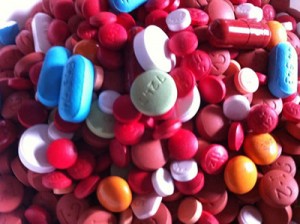Some people report that certain drugs, whether prescribed, over the counter or recreational, affect their dreams.
It’s true that many drugs have an effect on REM sleep. Vivid dreams are associated with REM sleep, so these drugs can also have an effect on dreaming.
However, dreaming and REM sleep are two different things. They’re created in different parts of the brain, and it’s possible to dream without experiencing REM sleep and to experience REM sleep without dreaming. Nevertheless, understanding how different medications affect your sleep cycle can help you understand how they affect your dreams.
Some drugs increase REM sleep while others decrease it. If you stop taking a drug that reduces the amount of time you spend in REM sleep, you may experience REM rebound and have many vivid dreams or nightmares.
Drugs that Increase REM Sleep
Melatonin
Melatonin is a hormone that helps regulate the sleep cycle.
Research shows that when melatonin is given to people who don’t get the normal amount of REM sleep, their REM sleep time increases.
Some studies show that melatonin could be used to treat REM sleep behavior disorder (RBD).
Acetylcholinesterase inhibitors
These are drugs, such as donepezil (Aricept), which inhibit the breakdown of the neurotransmitter acetylcholine. Levels of acetylcholine are high during wakefulness and REM sleep, but not during REM sleep.
Acetylcholinesterase inhibitors are used to treat dementia and Parkinson’s disease. Research shows that when people with Alzheimer’s disease take these drugs, they have more REM sleep and more nightmares.
Nootropics
Nootropics, such as piracetam and aniracetam, are drugs that enhance learning and memory. They are prescribed to people suffering from dementia and other cognitive disorders, but many healthy people take them, without a prescription, as cognitive aids.
These drugs increase acetylcholine production.
Research shows that nootropics can restore REM sleep in rats that have been REM sleep-deprived.
Some people think taking nootropics helps them have lucid dreams.
Prazosin
Prazosin is a drug that lowers blood pressure. It has been found to increase REM sleep and is used to treat people with post traumatic stress disorder (PTSD). REM sleep relieves stress. It is disturbed in people with PTSD. Lack of sufficient REM sleep causes PTSD sufferers to have terrible nightmares.
Drugs that Decrease REM Sleep
Antidepressants
Many types of antidepressants can decrease REM sleep. These include, selective serotonin reuptake inhibitors (SSRIs), such as fluoxetine (Prozac), paroxetine (Paxil) and sertraline (Zoloft), tricyclic antidepressants, such as amitriptyline (Elavil), desipramine (Norpramin) and imipramine (Tofranil), and monoamine oxidase inhibitors (MAOIs), such as phenelzine (Nardil). MAOIs seem to suppress REM sleep completely.
The fact that antidepressants cause a reduction in REM sleep could be a good thing. People who are depressed spend more time in REM sleep than people who aren’t depressed, so it’s possible that reducing REM sleep could help alleviate depression.
Amphetamines
Amphetamines, such as Adderall and Ritalin, will suppress REM sleep.
Lithium
Lithium is used to treat bipolar disorder. Studies show it causes a reduction in REM sleep.
Sleeping pills and sedatives
Barbiturates, such as secobarbital sodium (Seconal) and benzodiazepines, such as diazepam (Valium) and lorazepam (Ativan) decrease the amount of time spent in REM sleep.
This means that when people take these drugs to help them sleep, they are actually interfering with their natural sleep cycle.
People who are withdrawing from barbiturates can develop REM sleep behavior disorder.
(Photo Credit: ParentingPatch, Creative Commons License)

